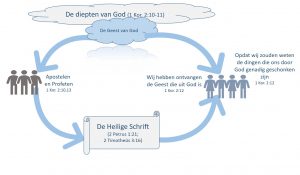Recently I came across the following:
“The true teaching does not exist. Absolute truth does not exist in letters, dogmas or rules. The Truth is a person. The Truth finds itself in a relationship, reveals itself in a relationship. And a relationship is dynamic, has seasons, is influenced by feeling and experience. Dogmas and theology imposed as truth stifle the relationship and cause alienation. It blinds people and is a breeding ground for schism and division.”
You could philosophize endlessly about this quote. There are things that are correct, but also pertinent inaccuracies. The message that is conveyed is that the teaching doesn't really matter, because 'it's about the relationship'. And that view is a fallacy. You can hear it a lot – in all kinds of variants – and it has taken hold in large parts of Christendom.
With such a quote you are immediately confronted with the question of how it works. We have the same Spirit of God, don't we? Would He tell us all different truths? I was reminded of what Paul wrote to the Corinthians at the beginning of his first letter and especially what is presented to us there about the Spirit of God.
Glory in the Lord
If you were to present the above quote to the congregation at Corinth, you would probably get a lot of acclaim. They disagreed on all sorts of things there and were already divided into 'denominations' (1 Corinthians 1:12). And of course all that misery has come because everyone clung to 'the truth', or rather 'his own truth'. They would also like to confirm that.
In the first two chapters of the first letter, Paul makes clear to the Corinthians that 'their own truth' is nothing more than 'the wisdom of men' (eg 2:5). He contrasts it with 'the wisdom of God', which is “Christ the Crucified” (eg 1:23,24,30; 2:2,7).
“But we speak the wisdom of God as a mystery; a wisdom that was hidden, which God predestined for our glory from all ages” (1 Corinthians 2:7)
That was the gospel that Paul preached: Christ the Crucified,'the power of God and the wisdom of God'. Christ the Crucified is the One in Whom the power of God and the wisdom of God are perfectly expressed. For those who want to see it anyway. For to the Jews it is a stumbling block and to the Greeks foolishness (1:23).
You could say that theologians and religious ("Jews") and philosophers ("Greeks") cannot grasp it with human wisdom. They can try to understand and reason it, but they won't succeed. Indeed, by human standards it is great folly.
God in His wisdom thought well that it should be hidden from men of their great wisdom. After all, if they could reason it out, they could still boast that they can 'count' God, and that is not what God wants: “(…) that no flesh should boast before Him” (1:29).
But God has thought well that the 'fools of the world, the insignificant and the despised of the world' (1:26-28) would believe in Christ Jesus,Who became for us wisdom from God and righteousness, sanctification and redemption”. People who have nothing of their own to boast about. Who can do nothing but accept that which God in His wisdom in Christ has given them, namely,
- Justice – a new position as righteous before God; clothed with His righteousness (2 Corinthians 5:21)
- Sanctification – a new place of seclusion from the world and devotion to God
- Salvation – a new man, redeemed from the guilt of sin and living in the expectation of 'the redemption of the body' (Romans 8:23)
Then nothing remains but to magnify that God, as it is written:
- “(...) whoever boasts, let him boast in the Lord” (1:31);
- “Eye hath not seen, nor ear heard, nor entered into the heart of man, which God hath prepared for them that love him” (2:9).
About the Spirit of God
The passage that follows (1 Corinthians 2:10 -16) makes clear to us a special work of the Holy Spirit[1].
- The Spirit of God searches the things of God, even the depths of God (verses 10-11). What can that mean but that the Spirit knows the heart of God and what is in it. God's mystery, the wisdom of God, Christ the Crucified, and all God's thoughts about Him and those who would partake of His glory (see verse 7). It is God's Spirit who knows God's heart and His secret like no other.
- That secret God revealed to the apostles by His Spirit (verse 10). They speak (and write) about it in words that the Holy Spirit teaches them (verse 13). That is why the New Testament, like the Old, is also 'God-breathed' (2 Timothy 3:16) and you can say that the whole Scripture is the Spirit-given revelation of God (see also 2 Peter 1:21).
- We too have the Spirit who is received from God (verse 12). When I turned to God and accepted the Lord Jesus as my Savior and Lord, the Spirit of God came to dwell in me (Romans 8:9). That goes for everyone who believes in Him, so that we may all'by means of one Spirit to baptized in one body (…) and we are all of one Spirit infused' (1 Corinthians 12:13). It is the same Spirit that dwells in all of us.
- The Spirit in us makes us know the things that have been graciously given to us by God (verse 12). We read God's Word that is inspired by the Spirit and in which that same Spirit has recorded 'God's secrets of the heart'. Then the same Spirit fastens those things in our hearts so that we know them. “(…) that we might know the things which God has graciously given us”.
- In this way "spiritual things are connected with spiritual things" (verse 13). In the original Greek this seems to be a somewhat incomplete sentence, as if Paul does not know exactly how to express himself and cannot put it into words. I take it that he means that in this way it becomes clear that the spiritual things that are in God's heart are connected with the spiritual things in our heart.[2]. It is the same things that are in God's heart that now occupy us and fill our hearts! That is a miracle that you have no words for!
When we have said that Christ is the center of God's heart, it has been a work of the Spirit to give us the written Word of God and it is also the same Spirit who confirms the knowledge (verse 12) in our hearts. What can the apostle but conclude in verse 16: 'We have the mind of Christ'?
Of course we have our limitations in many ways, but a spiritual person allows himself to be taught by the Spirit from the Word in order to become more like our Lord Jesus Christ in his mind (see also 2 Corinthians 3:18).
A small and imperfect attempt to make this visible is below.

Judge
Now in verses 14 and 15 there is something else that we have left out in the overview above, but is certainly not unimportant.
“But the natural man does not receive the things of the Spirit of God, for they are foolishness to him. Nor can he come to know them, because they are spiritually judged. The spiritual man judges all things, but he himself is not judged by anyone.”
Above we have discovered that it is the Spirit of God who makes known to us God's thoughts from the depths of God's heart. But these verses 14 and 15 make it clear to us that the Holy Spirit is not 'overruling' us, so to speak. He does not go beyond our own judgment. These verses show that the Holy Spirit leaves human judgment intact and functioning. Both in the natural man and in the spiritual man.
With 'the natural man' it leads to rejection of God's thoughts, “for they are foolishness to him”. Note that this does not say 'the unbeliever', but that this refers to the human being who lives from his human nature (the psyche, the soul). This person cannot get to know (understand) those things of God either.
'The spiritual man' does not just 'pour in' the things of the Spirit, but he 'judges all things'. In this way he gets to know the things of God: a special work of God's Spirit, but at the same time his own responsibility and activity to want to know and understand the things of God.
Back to the truth
The part we have discussed here is in a remarkable place. It is sandwiched between Paul's remarks about the divisions in Corinth (1 Corinthians 1:10-13 and 3:3-6). When Paul talks about the divisions in Corinth, it's not about who is right or who has a better understanding of 'the truth', but he is showing us (and the Corinthians) what God means. has in 'the church of God' (1 Corinthians 1:2a):
- There is nothing we can boast about. It is God's gospel, Christ Crucified the wisdom of God. Human thinking and reasoning is out of the question. All that remains is to 'glory in the Lord'.
- What we know of the things of God is (and is) communicated to us by the Spirit of God. That same Spirit who also knows the depths of God (re)forms our thinking through Scripture and gives us 'the mind of Christ'.
We are people who'love God' (2:9) and 'know the things that have been graciously given to us by God' (2:12). Being 'the things of the Spirit of God' (2:14) whom the Spirit teaches us,'not with words of human wisdom' (2:13).
There is no room here for pointless discussions about 'the truth'; these are, at best, only human reasoning. That is why we cling to our Lord, Jesus Christ, Who Himself is the Truth, and we continue to cling to the Word of truth, the gospel of our salvation. All this has been given to us in grace by God's Spirit in a wonderful way and we continue to do so.
“In Him (Christ) you also are, after you have heard the word of truth, even the gospel of your salvation; in Him also, when you believed, you were sealed with the Holy Spirit of promise . . .' (Ephesians 1:13).
[1] I'll leave here for a moment who Paul might mean by "we" in this section. Chapter 2 begins with 'I' and 'you'. From verse 6 it is 'we' and chapter 3 continues with 'I' and 'you'.
[2] The Naarden Bible has in verse 13: '(…) and thus we unite spiritually with spiritually'



